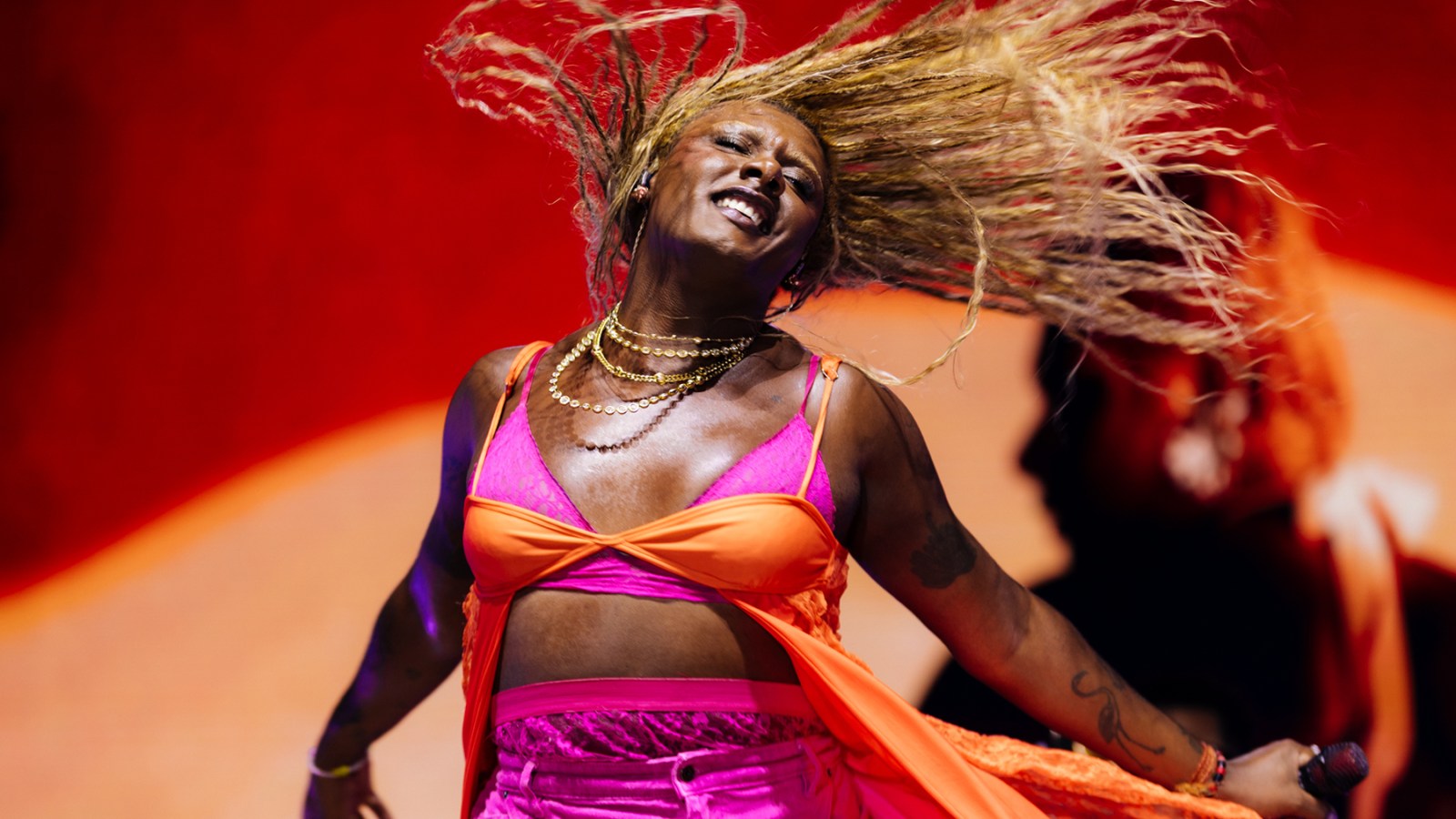The three-block stretch between Columbus Circle and Grand Army Plaza just on the southern border of Central Park is so busy that it’s hard to know where to look. Near the entrance on 59th street, horse-drawn carriage drivers vie for the attention of tourists, while across the road, serious-looking people in business attire idle in front of the Carnegie Hotel, presumably waiting for someone important.
The Brazilian singer and songwriter Liniker, who has just landed in muggy New York to perform at Lincoln Center’s Brazil Week, has questions: Who are the suits going to meet? Are they famous? And is anyone shelling out upwards of $100 for the ride? The more she thinks about it, the less likely it seems that she’ll arrive at an answer, so she opts to capture this tableaux on her film camera instead.
As we enter Central Park to find a spot to sit down, she points at a squirrel gripping the side of a tree trunk, and stops to take a picture before it beetles upwards and disappears into the canopy. When another one crops up — this time on the grass — she snaps another photo.
“It’s like they’re making little waves with their bodies,” Liniker says in Portuguese, wearing a white tiered, maxi skirt and a matching white top. Here in New York, the artist gets to feel anonymous in a way that no longer feels possible back home. In her native Brazil, where her songs rack up millions of streams per month, she has become something of a pop phenomenon.
After training as an actress, Liniker first made a name for herself as the singer for the band Liniker e os Caramelows, but has since left the group. In 2022, her first solo record, the soulful Indigo Borboleta Anil, earned her a Latin Grammy award, making her the first trans woman to receive the prize. Her latest LP, last year’s CAJU, plays with a more varied sonic palette, moving into decidedly pop territory. Melding pagode, hip-hop, samba, and electronica, it has expanded her audience significantly, and pushed her further into the spotlight.
Born in Araraquara, a city north of São Paulo, Liniker, who was named after the British goalie Gary Lineker (it was her soccer-loving uncle’s idea), grew up in a creative family. She found a continuous source of support and inspiration in her mother, a samba dancer who taught her that art could be a form of resistance. “In spite of everything she went through raising me and my brother by herself,” Liniker says, “she always gave me the chance to live my life the way I wanted to live it.”
When Liniker and Fejuca, one of her trusted collaborators and a co-producer on both of her solo records met, they bonded over their similar upbringings. “She comes from a big, musical family and I do too,” he says, calling from his car in between studio sessions in Rio de Janeiro. “And so we both experienced these Black Brazilian gatherings where people listen to everything: Tim Maia, Marvin Gaye, Os Racionais.”
In the early stages of making CAJU, a concept album based on an imaginary one day trip to Japan, Liniker, Fejuca and co-producer Gustavo Ruiz, knew they wanted to tap into this past, and make the work feel nostalgic. “So we recorded the whole thing using analog tape,” Fejuca says.
At the park, Liniker tells me she also wanted the work to feel “cinematic.” The trio looked for a way to create a sense of continuity between songs. “If you listen closely, you’ll hear everyday sounds in all the tracks: there’s a door closing, keys, rain, footsteps, the Japanese flight attendant whose voice opens the record,” she says.
Some of these compositions start in Liniker’s journals. “I keep a diary,” she says, “and I also write poems and songs, and letters, mostly by hand.” Her lyrics are personal, introspective, and often a little tongue-in-cheek. “Have you memorized the number of tattoos I have?” she asks a lover, in earnest, in the title track “CAJU” over a smooth R&B beat. “How many shows are in my schedule? What my favorite album is? How much my heart weighs?”
During the pandemic, the singer Moses Sumney would occasionally go live on Instagram and add people who requested to join. One day, Liniker sent him a request and they struck up a conversation. While he had heard her name around, he wasn’t familiar with her music. Then thousands of Brazilians flooded in and started commenting. “And I thought to myself, ‘I’m clearly very late to this because this person is a huge star,’” he recalls.
After they got off the call, Sumney checked out her music and became a fan. “It’s cool seeing how she combines R&B music with a truly Brazilian aesthetic,” he says. “What she does is so beautiful.” The two ended up becoming pen pals and when Sumney was in Brazil earlier this year, Liniker invited him to see one of her shows in Salvador, Bahia. “It was like seeing Brazilian Beyoncé,” Sumney says. “The hair whips, the outfits, the crowd.”
The next time I see Liniker, she’s running around the stage at Damrosch Park in Lincoln Center in an asymmetrical glittery dress and knee high boots, her band members shimmying behind her in lime green outfits. People in the audience are moving, jumping, and singing along. Most aren’t sitting on the chairs the organizers set up for them earlier in the day. It’s clear this is music you can dance to.
Liniker feels emotional being at a venue where so many prominent Brazilian artists have performed over the years. “It’s such an achievement for any of us to be able to cross the ocean to get to any place that isn’t the place we’re from,” she said to the crowd in Portuguese. “That applies to us musicians, but it also applies to anyone who has immigrated to a country they weren’t born in dreaming of a better life. When we’re up here, we’re also dreaming a different dream, and I’m so glad that dream fits in the mouths of so many people today.”
Lately, while reflecting on her career, it’s dawned on her that she never wants to take anything for granted. “What an honor,” she told the crowd as the night drew to an end and she prepared to leave the stage. “I’m so happy.”



